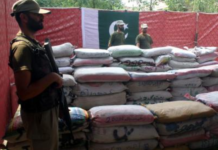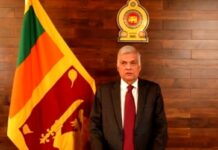By Anil Giri
Kathmandu–The first meeting of the Eminent Persons Group (EPG) comprising diplomats from both Nepal and India has agreed to a review of a gamut of bilateral issues, including the treaties and agreements since the 1950 Indo-Nepal Treaty of Peace and Friendship was signed between the two neighbours.
While a review of all bilateral treaties was Nepal’s prime agenda, the Indian side was keen to chart out the future course of cooperation in various sectors, including economic, connectivity, infrastructure, trade and commerce, among others.
The meeting finalised five issues for future discussion and will submit a report to the respective governments after the EPG completes its two-year term.
The five clusters include political ties, government-to-government ties, economic exchanges, development cooperation and social and cultural aspects.
The meeting on Tuesday agreed to review all aspects of bilateral ties, said Bhekh Bahadur Thapa, EPG co-chair from the Nepal side. He said the body would examine bilateral treaties and agreements, and MoUs signed following the Peace and Friendship Treaty of 1950 — which Nepal called “mother of all treaties” with India.
The mechanism, however, will not review relevance of the tripartite Nepal-Britain-India security agreement of 1947 that ensured continuation of recruitment of Nepali youth in British and Indian armies.
All agreements of political nature, including the 1950 treaty, will be reviewed under the political cluster. All trade- and transit-related deals, including the recent Bilateral Investment Promotion and Protection Agreement, will be placed under the economic cluster. Understandings on Nepal-India development assistance and other financial support will be observed under the category of development cooperation.
“We have not excluded any deal that the two countries signed after 1950,” Thapa said after the meeting.
Bhagat Singh Koshyari, EPG co-chair from India, said both sides agreed to come up with a comprehensive, acceptable, pragmatic and implementable recommendation on how to improve Nepal-India ties in the changed context of the 21st century. He said the recent misunderstanding between Nepal and India was temporary and expressed confidence that all misgivings would be resolved soon.
Another Indian EPG member Mahendra P Lama said they will come up with a common document that will reflect the aspirations of the people of India and Nepal 35 years beyond.
Former Indian Ambassador to Nepal Jayanta Prasad said the EPG should focus on bilateral connectivity, development cooperation, trade and commerce, energy and information and communication.
“We should increase cooperation and friendship that is based on people-to-people relations,” said Prasad.
It was also decided to hold the next meeting in India after three months.
The formation of the EPG took over a year, which was agreed during the visit of Indian Prime Minister Narendra Maodi to Nepal in August, 2014.
EPG is mandated to review all bilateral reports, besides suggesting what needs to be updated, amended or replaced by new treaties, agreements and arrangements and propose new ways of Nepal-India ties in the changed context. It will then forward its recommendations to the respective governments for implementation.
Nepali EPG members include former Foreign Minister Bhekh Bahadur Thapa, former Chief Commissioner of the Commission for Investigation of Abuse of Authority Surya Nath Upadhyay, former Law Minister Nilambar Acharya and CPN-UML lawmaker Rajan Bhattarai.
The Indian EPG members are senior Bharatiya Janata Party leader Bhagat Singh Koshyari, former Vice-Chancellor of Sikkim University Mahendra Lama, former Indian ambassador to Nepal Jayant Prasad and VIF senior fellow B.C. Upreti. (IANS)






